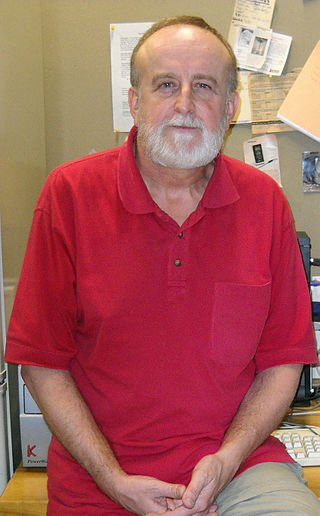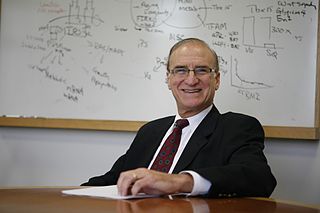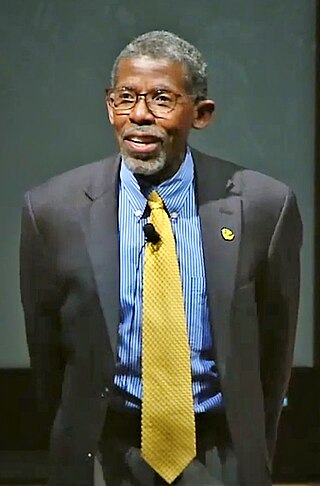
John Jacob Abel was an American biochemist and pharmacologist. He established the pharmacology department at Johns Hopkins University School of Medicine in 1893, and then became America's first full-time professor of pharmacology. During his time at Hopkins, he made several important medical advancements, especially in the field of hormone extraction. In addition to his laboratory work, he founded several significant scientific journals such as the Journal of Biological Chemistry and the Journal of Pharmacology and Experimental Therapeutics.
The Kolling Institute is located in the grounds of the Royal North Shore Hospital in St Leonards, Sydney Australia. The institute, founded in 1920, is the oldest medical research institute in New South Wales.
Sir Philip Cohen is a distinguished English biochemist known for his extensive contributions to the field of biochemistry, especially to the understanding of the role of reversible protein phosphorylation in cell regulation.
David Ernest James is a cell biologist who discovered the glucose transporter GLUT4. He has also been responsible for the molecular dissection of the intracellular trafficking pathways that regulate GLUT4 translocation to the cell surface, the topological mapping of the insulin signal transduction pathway, the creation of a method for studying in vivo metabolism in small animals, and the use of this method to gain insights into whole-animal fuel metabolism and homeostasis.

Kenneth B. Storey is a Canadian scientist whose work draws from a variety of fields including biochemistry and molecular biology. He is a Professor of Biology, Biochemistry and Chemistry at Carleton University in Ottawa, Canada. Storey has a world-wide reputation for his research on biochemical adaptation - the molecular mechanisms that allow animals to adapt to and endure severe environmental stresses such as deep cold, oxygen deprivation, and desiccation.
Utpal Banerjee is a distinguished professor of the department of molecular, cell and developmental biology at UCLA. He obtained his Bachelor of Science degree in chemistry from St. Stephen's College, Delhi University, India and obtained his Master of Science degree in physical chemistry from the Indian Institute of Technology, Kanpur, India. In 1984, he obtained a PhD in chemistry from the California Institute of Technology where he was also a postdoctoral Fellow in the laboratory of Seymour Benzer from 1984-1988.
Lewis C. Cantley is an American cell biologist and biochemist who has made significant advances to the understanding of cancer metabolism. Among his most notable contributions are the discovery and study of the enzyme PI-3-kinase, now known to be important to understanding cancer and diabetes mellitus. He is currently Meyer Director and Professor of Cancer Biology at the Sandra and Edward Meyer Cancer Center at Weill Cornell Medicine in New York City. He was formerly a professor in the Departments of Systems Biology and Medicine at Harvard Medical School, and the Director of Cancer Research at the Beth Israel Deaconess Medical Center, in Boston, Massachusetts. In 2016, he was elected Chairman of the Board for the Hope Funds for Cancer Research.
Victor Darley-Usmar is a free-radical biologist and biochemist, the UAB Endowed Professor in Mitochondrial Medicine and Pathology at the University of Alabama at Birmingham. Darley-Usmar also contributed to a book titled Microbes, Bugs & Wonder Drugs, a science book written for young readers and their families.

Sir Stephen Patrick O'Rahilly is an Irish-British physician and scientist known for his research into the molecular pathogenesis of human obesity, insulin resistance and related metabolic and endocrine disorders.

Carl Ronald Kahn is an American physician and scientist, best known for his work with insulin receptors and insulin resistance in diabetes and obesity. He is the Chief Academic Officer at Joslin Diabetes Center, the Mary K. Iacocca Professor of Medicine at Harvard Medical School and a member of the National Academy of Sciences since 1999.

Susan G. Amara is an American professor of neuroscience and is the Scientific Director of the National Institute of Mental Health. Dr. Amara is an elected member of the National Academy of Sciences and a fellow of the American Association for the Advancement of Science. She is a Past-President of the Society for Neuroscience. Dr. Amara has a B.S. in Biological Sciences from Stanford University and a Ph.D. in Physiology and Pharmacology from the University of California, San Diego.
Roger D. Cone is the Mary Sue Coleman Director of the Life Sciences Institute and the Vice Provost for the Biosciences Initiative at the University of Michigan; a member of the editorial board for the journal Cell Metabolism; and a member of the National Academies of Sciences and Medicine. He is a noted researcher in the biological underpinnings of obesity, anorexia, cachexia and other eating and metabolic disorders.
Chinmoy Sankar Dey is an Indian molecular biologist and a professor at Kusuma School of Biological Sciences of the Indian Institute of Technology, Delhi. Known for his research on insulin resistance, Dey's is a J. C. Bose National Fellow of the Department of Science and Technology and an elected fellow of the National Academy of Sciences, India and the Indian National Science Academy. The Council of Scientific and Industrial Research, the apex agency of the Government of India for scientific research, awarded him the Shanti Swarup Bhatnagar Prize for Science and Technology, one of the highest Indian science awards for his contributions to Medical Sciences in 2003. He is also a recipient of the National Bioscience Award for Career Development of the Department of Biotechnology.

Gökhan S. Hotamisligil is a Turkish-American physician scientist; James Stevens Simmons Chair of Genetics and Metabolism at Harvard T.H. Chan School of Public Health (HSPH); Director of the Sabri Ülker Center for Metabolic Research and associate member of Harvard-MIT Broad Institute, Harvard Stem Cell Institute and the Joslin Diabetes Center.
Ruma Banerjee is a professor of enzymology and biological chemistry at the University of Michigan Medical School. She is an experimentalist whose research has focused on unusual cofactors in enzymology.

Namandjé N. Bumpus is an American pharmacologist who serves as the Principal Deputy Commissioner and Acting Chief Scientist of the Food and Drug Administration. She was previously director of the department of pharmacology and molecular sciences at Johns Hopkins University School of Medicine, where she holds the E.K. Marshall and Thomas H. Maren professorship in pharmacology. Bumpus is known for her research on the metabolism of antiviral drugs used to treat HIV-1 and how genetic variations in drug-processing enzymes may impact these drugs' efficacy. Bumpus received a Presidential Early Career Award for Scientists and Engineers in 2016. The Food and Drug Administration’s top scientist Namandjé Bumpus has assumed the role of principal deputy commissioner when longtime agency leader Janet Woodcock retired from that role in January 2024.
Barbara B. Kahn is an endocrinologist and the George Richards Minot professor of medicine at Harvard Medical School. She is also the vice chair for research strategy in the department of medicine at Beth Israel Deaconess Medical Center, and was formerly the chief of the Division of Endocrinology, Diabetes, and Metabolism at Beth Israel Deaconess. Her research focuses on insulin resistance and type 2 diabetes.
Gerold Grodsky (1927–2022) was an American professor of biochemistry, biophysics, and medicine at the University of California, San Francisco Diabetes Center, as well as a diabetes researcher. He is most known for his contributions to the modern artificial pancreas.

Evan Dale Abel is an American endocrinologist who serves as Chair of the Department of Medicine at the David Geffen School of Medicine at UCLA. His works on the molecular mechanisms that underpin cardiac failure in diabetes. He is a Fellow of the American Heart Association and the American College of Physicians. He was elected a member of the National Academy of Sciences in 2022.
Shaodong Guo is a Chinese-American nutrition scientist, academic, and diabetes researcher. He is a professor in nutrition and medicine at the Department of Nutrition of Texas A&M University. He has been a senior editor for Journal of Endocrinology and Journal of Molecular Endocrinology.








